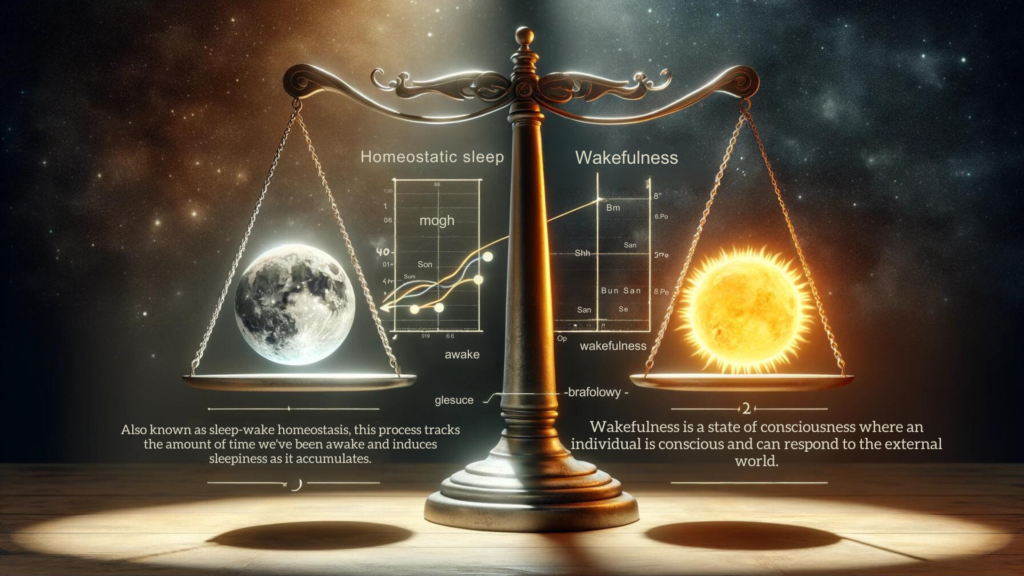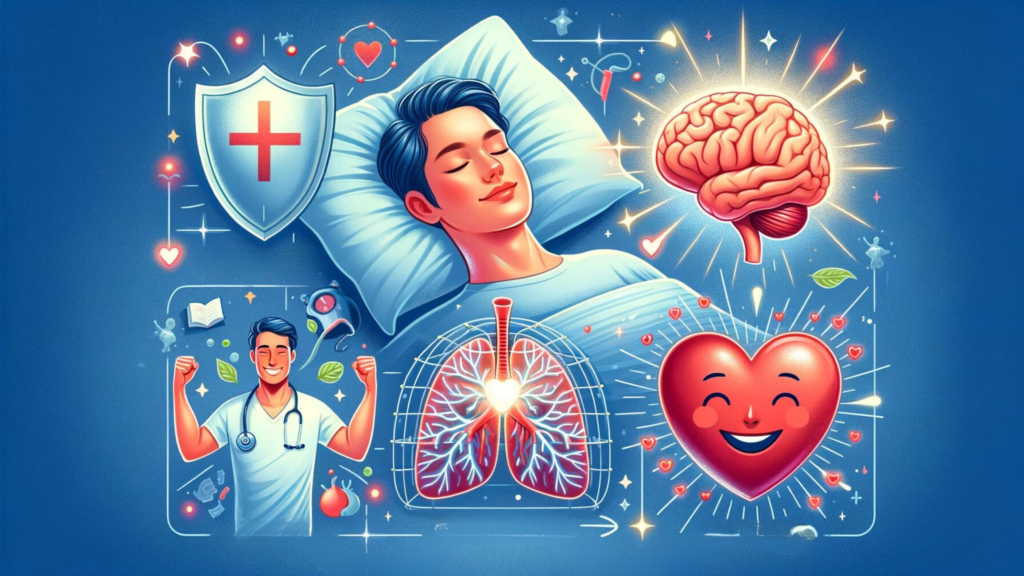Introduction: The Science of Sleep
Sleep, often considered just a passive state of rest, is a complex and dynamic process crucial to our well-being. While we close our eyes and drift off to dreamland, our bodies embark on an essential journey of repair, restoration, and rejuvenation. The science of sleep delves into this nocturnal activity, uncovering the mysteries of our sleep cycles and their profound impact on our health.
Understanding sleep is not just about recognizing its necessity; it’s about appreciating its profound role in shaping our physical, mental, and emotional health. From healing the wear and tear of daily life to consolidating memories and processing emotions, sleep touches every aspect of our existence. Yet, in our fast-paced, always-on world, sleep is often the first sacrifice at the altar of productivity and social life.
In this blog post, we will explore the intricate dance of sleep stages, the myriad benefits of quality slumber, and the startling repercussions of neglecting this fundamental human need. By peeling back the layers of sleep science, we aim to illuminate the importance of a good night’s rest and empower you with the knowledge to transform your sleep habits and, by extension, your life.
Understanding Sleep
Sleep is not merely a time of rest but a vital physiological state that influences every facet of our health and daily functioning. It’s orchestrated by an intricate interplay of biological processes governed by our internal circadian rhythms and homeostatic sleep drive. These two mechanisms work in tandem to regulate when we feel tired and when we are alert, ensuring we get the necessary amount of sleep.
Circadian Rhythms:
Our internal biological clock, the circadian rhythm, operates on a roughly 24-hour cycle, responding primarily to light and darkness in our environment. This rhythm dictates our sleep-wake patterns, signaling when it’s time to sleep at night and awaken in the morning. Exposure to natural light and darkness helps to keep our circadian rhythm aligned with the Earth’s day-night cycle.
Homeostatic Sleep Drive:
Also known as sleep-wake homeostasis, this process tracks the amount of time we’ve been awake and induces sleepiness as it accumulates. It creates a balance or “homeostasis,” ensuring we obtain sufficient sleep to compensate for the hours of wakefulness, much like hunger builds up the longer we go without eating.

During sleep, we cycle through two primary types: Rapid Eye Movement (REM) sleep and Non-Rapid Eye Movement (non-REM) sleep, each with distinct stages:
- Non-REM Sleep:
- Stage 1: The transition from wakefulness to sleep, lasting several minutes. Here, the heartbeat, breathing, and eye movements slow, and muscles relax.
- Stage 2: Light sleep before deeper sleep, where body temperature drops and eye movements stop. This stage accounts for the largest part of total sleep.
- Stage 3: Deep sleep, essential for feeling refreshed. During this stage, the body repairs tissues builds bone and muscle, and strengthens the immune system.
- REM Sleep:
- Begins about 90 minutes after falling asleep and recurs every 90 minutes. It’s the dream phase, characterized by rapid eye movements, increased brain activity, and temporary paralysis of the limb muscles to prevent acting out dreams.
Understanding these cycles and stages is key to appreciating why sleep is so crucial and how it affects our health and well-being. In the next sections, we’ll explore the benefits of quality sleep and the consequences of neglecting this critical biological need.
Benefits of Quality Sleep
Quality sleep is a cornerstone of good health, offering a range of benefits that touch nearly every aspect of our physical and mental well-being. Here we delve into how getting enough restorative sleep can profoundly impact our lives:
- Physical Health Enhancement:
- Immune System Boost: Adequate sleep strengthens the immune system, making it more efficient at fighting off infections. During sleep, the body produces and releases cytokines, a type of protein that targets infection and inflammation, creating an immune response.
-
- Heart Health: Sleep plays a crucial role in maintaining cardiovascular health. It helps regulate blood pressure and heart rate, reducing the risk of heart disease and stroke.
-
- Weight Management: Sleep affects the levels of hormones that control appetite. Lack of sleep can disrupt these hormones, leading to increased hunger and appetite, particularly for high-calorie foods.
- Mental Health and Cognitive Functions:
- Mood Regulation: Sleep helps to regulate the chemicals in our brain, including serotonin and dopamine, which influence our mood and emotions. Adequate sleep can help prevent mood swings, anxiety, and depression.
- Cognitive Performance: During sleep, important processes related to memory consolidation, problem-solving, and decision-making occur. Quality sleep can enhance learning, memory recall, and cognitive clarity.

-
- Creativity and Innovation: REM sleep, in particular, has been associated with integrating and reorganizing memories, which can foster creativity and innovative problem-solving.
- Recovery and Rejuvenation:
- Tissue Repair and Growth: During the deep stages of non-REM sleep, the body repairs and regrows tissues, builds bone and muscle, and strengthens the immune system, essential for recovery from physical exertion.
-
- Detoxification of the Brain: Sleep facilitates the removal of waste products from brain cells—a process crucial for the brain’s health and function, potentially lowering the risk of neurodegenerative diseases.
Understanding these benefits underscores the importance of prioritizing sleep in our daily lives. Not only does it repair and rejuvenate our bodies, but it also optimizes our mental health and cognitive abilities, equipping us to face the challenges of daily life with resilience and vitality.
Consequences of Sleep Deprivation
The effects of sleep deprivation extend beyond mere tiredness, impacting every facet of our health and daily life. Chronic lack of sleep can lead to serious physical, mental, and emotional health issues, as well as diminished quality of life. Here’s how sleep deprivation can take a toll on our well-being:
- Physical Health Risks:
- Increased Risk of Chronic Diseases: Insufficient sleep is linked to a higher risk of developing chronic conditions such as obesity, diabetes, cardiovascular disease, and hypertension. The disruption of hormone levels and the body’s ability to regulate glucose can exacerbate these risks.
-
- Impaired Immune Function: Sleep deprivation weakens the immune system’s effectiveness, making the body more susceptible to infections and slowing down recovery times.
-
- Neurological Impacts: Lack of sleep can lead to problems with cognitive functions, such as memory lapses, impaired judgment, and decreased coordination, increasing the likelihood of accidents and errors.

- Mental Health Consequences:
- Emotional Instability: Sleep loss affects the regulation of emotions, leading to irritability, mood swings, and increased stress. It can also exacerbate symptoms of mental health disorders such as anxiety and depression.
-
- Cognitive Decline: Chronic sleep deprivation can impair attention, alertness, concentration, reasoning, and problem-solving, making it more challenging to learn efficiently and perform well in daily tasks.
- Quality of Life Degradation:
- Fatigue and Decreased Energy: Continuous lack of sleep results in persistent tiredness, low energy levels, and a general feeling of lethargy, affecting one’s ability to engage in social, educational, and professional activities.
-
- Relationship Strain: Sleep-deprived individuals may experience strain in personal and professional relationships due to irritability, moodiness, and decreased patience.
Recognizing these consequences is crucial for understanding the significance of sleep and the need to treat sleep as a priority, akin to other essential health behaviors like diet and exercise. Addressing sleep issues is not just about avoiding these negative outcomes; it’s about enhancing overall health, well-being, and quality of life.
Factors Affecting Sleep
Numerous external and internal factors can influence the quality and duration of our sleep. Understanding these can help us make informed decisions to improve sleep habits and overall health. Here’s a closer look at some key factors affecting sleep:
- External Factors:
- Light Exposure: Light plays a crucial role in regulating our circadian rhythms. Exposure to bright light, especially blue light from screens before bedtime, can interfere with the production of melatonin, the hormone that signals our body it’s time to sleep.
-
- Noise: Consistent or loud noise can disrupt the ability to fall asleep and move through the sleep cycles effectively. It can lead to fragmented sleep and reduce overall sleep quality.
-
- Environment: The sleep environment, including the comfort of the bed, room temperature, and overall sense of safety and relaxation, significantly impacts sleep quality. An environment that is too hot, cold, or uncomfortable can hinder the ability to fall asleep or stay asleep.

- Internal Factors:
- Stress and Anxiety: Psychological factors such as stress, worry, and anxiety can greatly affect sleep quality. They can lead to racing thoughts, difficulty falling asleep, or frequent awakenings during the night.
-
- Diet and Nutrition: Consuming caffeine, alcohol, or heavy meals close to bedtime can disrupt sleep patterns. Similarly, deficiencies in certain nutrients can impact sleep quality and duration.
-
- Physical Health: Medical conditions like chronic pain, sleep apnea, restless leg syndrome, and other health issues can significantly disrupt sleep patterns, leading to poor sleep quality.
Understanding these factors is vital in identifying and modifying behaviors or conditions that impair sleep. By addressing these sleep influencers, individuals can significantly improve their sleep quality and, consequently, their overall health and well-being.
Improving Sleep Hygiene
Sleep hygiene refers to the habits and practices that are conducive to sleeping well on a regular basis. Improving sleep hygiene can greatly enhance the quality and quantity of your sleep. Here are some effective strategies to foster better sleep:
- Establish a Regular Sleep Schedule: Stick to a consistent sleep schedule, going to bed and waking up at the same time every day, even on weekends. This regularity strengthens the body’s sleep-wake cycle and can help you fall asleep more easily and wake up feeling refreshed.
- Create a Bedtime Routine: Develop a relaxing pre-sleep routine to signal to your body that it’s time to wind down. This could include activities like reading, taking a warm bath, or practicing relaxation exercises.

- Optimize Your Sleep Environment: Ensure your bedroom is conducive to sleep: keep it cool, quiet, and dark. Invest in comfortable bedding, and use blackout curtains or eye masks to block light. Minimizing noise with earplugs or white noise machines can also help.
- Monitor Food and Drink Intake: Avoid large meals, caffeine, and alcohol close to bedtime. These can disrupt sleep or make it more difficult to stay asleep.
- Limit Screen Time: Reduce exposure to screens from smartphones, tablets, and computers before bed. The blue light emitted by these devices can interfere with the ability to fall asleep.
- Stay Active During the Day: Regular physical activity during the day can help you fall asleep more easily at night. However, try to avoid vigorous exercise close to bedtime, as it can have the opposite effect.
By incorporating these practices into your daily routine, you can improve your sleep hygiene, leading to better sleep quality and increased overall health and well-being.
Innovations in Sleep Science
The field of sleep science has seen significant advancements in recent years, with innovations aimed at understanding and improving sleep quality. These developments not only enhance our knowledge of sleep but also offer new tools and methods to optimize rest. Here are some of the notable innovations in sleep science:
- Wearable Sleep Technology: Devices like smartwatches and fitness trackers have revolutionized the way we monitor sleep, providing insights into sleep patterns, duration, and quality. These wearables use sensors to track movements, heart rate, and even oxygen levels during sleep, offering detailed data that can help identify sleep issues and improve sleep hygiene.
- Sleep Apps and Platforms: Various apps are designed to improve sleep through guided meditations, sleep tracking, and personalized insights. Some use cognitive behavioral therapy for insomnia (CBT-I) techniques to help users develop better sleep habits and address the psychological aspects of sleep disturbances.
![]()
- Advanced Mattresses and Pillows: The market has seen an influx of smart mattresses and pillows that adjust automatically to optimize sleep comfort, support, and temperature regulation. These products can monitor sleep stages and movements, adjusting firmness or temperature in real time to improve sleep quality.
- Light Therapy: Innovations in light therapy have led to the development of devices that mimic natural light patterns, helping to regulate the circadian rhythm and improve sleep quality, particularly for those suffering from seasonal affective disorder (SAD) or jet lag.
- Genetic Research in Sleep: Cutting-edge research is exploring the genetic basis of sleep, including how genes influence sleep duration, quality, and susceptibility to sleep disorders. This research has the potential to lead to personalized sleep medicine, offering treatments tailored to individual genetic profiles.
These advancements in sleep science are empowering individuals to take control of their sleep health, providing tools and knowledge to enhance sleep quality and, by extension, overall health and well-being.
Conclusion
Understanding the science of sleep is pivotal in recognizing its vital role in our overall health and well-being. As we’ve explored, quality sleep enhances physical and mental health, supports cognitive function, and is integral to emotional stability. Conversely, sleep deprivation can have far-reaching negative consequences, impacting everything from daily performance to long-term health. The innovations in sleep science offer promising tools and insights, aiding in the pursuit of better sleep and, consequently, a better life. By prioritizing sleep hygiene and embracing the knowledge and technologies available, we can unlock the profound benefits of restorative sleep. Embracing the science of sleep is not just about improving night-time rest; it’s about enhancing the quality of our waking hours and enriching our lives.
Author’s Note
As someone deeply fascinated by the intricate world of sleep science, I’ve endeavored to present a comprehensive overview that enlightens and empowers readers. My journey into understanding sleep has transformed my own life, and I hope this blog inspires you to embrace the transformative power of restful nights.
G.C., Ecosociosphere contributor.
References and Further Reading
- “Why We Sleep: Unlocking the Power of Sleep and Dreams” by Matthew Walker – An exploration of sleep’s impact on our health, brain function, and psychological well-being.
- “The Sleep Solution: Why Your Sleep is Broken and How to Fix It” by W. Chris Winter – A guide to identifying sleep problems and practical solutions for better rest.
- “Sleep: A Very Short Introduction” by Steven W. Lockley and Russell G. Foster – A concise yet comprehensive overview of the science of sleep and its vital role in human life.





Comments
Can you be more specific about the content of your article? After reading it, I still have some doubts. Hope you can help me.
Your point of view caught my eye and was very interesting. Thanks. I have a question for you.
I don’t think the title of your article matches the content lol. Just kidding, mainly because I had some doubts after reading the article.
Thank you for your sharing. I am worried that I lack creative ideas. It is your article that makes me full of hope. Thank you. But, I have a question, can you help me?
Can you be more specific about the content of your article? After reading it, I still have some doubts. Hope you can help me.
Thank you for your sharing. I am worried that I lack creative ideas. It is your article that makes me full of hope. Thank you. But, I have a question, can you help me?
Your point of view caught my eye and was very interesting. Thanks. I have a question for you.
Thank you for your sharing. I am worried that I lack creative ideas. It is your article that makes me full of hope. Thank you. But, I have a question, can you help me?
Thank you for your sharing. I am worried that I lack creative ideas. It is your article that makes me full of hope. Thank you. But, I have a question, can you help me?